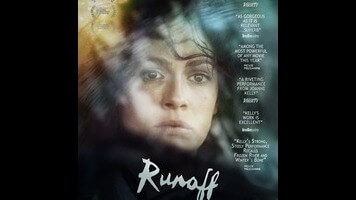Director Kimberly Levin, a former biochemist who’s started a second career as a writer-director, makes her feature debut with Runoff, a bucolic drama that hinges on one woman’s decision whether to imperil her family’s future in order to provide for their present. In keeping with Levin’s background, this decision has an environmental element, as farm wife Betty (Joanne Kelly) considers taking a job illegally disposing of some hazardous chemicals for a more successful farmer in order to solve her family’s mounting financial problems.
The crime element has led some to describe Runoff as a thriller, a moniker that also invites comparisons to another independent film focusing on a rural woman facing impossible odds, Winter’s Bone. Like that film, Runoff is driven by a compelling performance by its female star; Kelly, probably best known for her role on Syfy’s Warehouse 13, is remarkable in the lead role, conveying Betty’s warmth, compassion, and quiet strength in suggestive and utterly believable ways.
However, Runoff is a more understated film overall. Aside from their son Finley (Alex Schaffer) smoking a little weed, Betty and her family are wholesome, hardworking people, and she and her husband Frank (Neal Huff) genuinely love each other, even after it’s revealed that Frank may have been making their problems worse by concealing them from Betty. Levin, who also wrote the film, touches on a number of politically charged issues in her story—pollution, immigration, corporate greed, and healthcare all factor into the plot—but her commitment to realism keeps them from feeling preachy. Even when Levin’s symbolism is a little on the nose, these elements are balanced with enough small details and moments that they blend in to the larger texture of the characters’ lives.
Like its rural setting, Runoff is slow, deliberate, and concerned with practical things. Cinematographer Hermes Marco shoots the hilly countryside (the film was shot in Kentucky, although it could represent any number of Southern or Midwestern farm communities) with a clean digital look, and Levin constructs her scenes out of static, thoughtfully composed shots. But where this delicate touch is an asset visually, the same can’t be said of the sound mix, which is so quiet that it’s a struggle to hear the dialogue during muted moments.
As sometimes happens with these slow-burn dramas, during the second act there’s a period where Runoff slows to a crawl just as the main conflict of the story begins to unfold. But patient viewers will be rewarded with a final scene that encapsulates the themes of the film so well, and in such an emotionally affecting fashion, that slogging through the setup is worth it. As a female-led, character-driven adult drama, Runoff’s commercial prospects are limited, especially considering its summer release date. But for viewers craving a film that requires them to sit still and actually turn on their brains, Runoff may provide a welcome warm-weather respite.

 Keep scrolling for more great stories.
Keep scrolling for more great stories.
